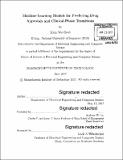Machine-learning models for predicting drug approvals and clinical-phase transitions
Author(s)
Siah, Kien Wei
DownloadFull printable version (7.306Mb)
Other Contributors
Massachusetts Institute of Technology. Department of Electrical Engineering and Computer Science.
Advisor
Andrew W. Lo.
Terms of use
Metadata
Show full item recordAbstract
We apply machine-learning techniques to predict drug approvals and phase transitions using drug-development and clinical-trial data from 2003 to 2015 involving several thousand drug-indication pairs with over 140 features across 15 disease groups. Imputation methods are used to deal with missing data, allowing us to fully exploit the entire dataset, the largest of its kind. We achieve predictive measures of 0.74, 0.78, and 0.81 AUC for predicting transitions from phase 2 to phase 3, phase 2 to approval, and phase 3 to approval, respectively. Using five-year rolling windows, we document an increasing trend in the predictive power of these models, a consequence of improving data quality and quantity. The most important features for predicting success are trial outcomes, trial status, trial accrual rates, duration, prior approval for another indication, and sponsor track records. We provide estimates of the probability of success for all drugs in the current pipeline.
Description
Thesis: S.M., Massachusetts Institute of Technology, Department of Electrical Engineering and Computer Science, 2017. Cataloged from PDF version of thesis. Includes bibliographical references (pages 105-106).
Date issued
2017Department
Massachusetts Institute of Technology. Department of Electrical Engineering and Computer SciencePublisher
Massachusetts Institute of Technology
Keywords
Electrical Engineering and Computer Science.